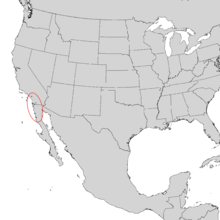Cupressus forbesii
| Cupressus forbesii | |
|---|---|
 |
|
| One of the few survivors of 2006 Coal Canyon Fire, Cleveland National Forest. | |
| Scientific classification | |
| Kingdom: | Plantae |
| Division: | Pinophyta |
| Class: | Pinopsida |
| Order: | Pinales |
| Family: | Cupressaceae |
| Genus: | Cupressus |
| Species: | C. forbesii |
| Binomial name | |
|
Cupressus forbesii Jeps. 1922 |
|
 |
|
| Natural range of Cupressus forbesii | |
 |
|
|
Cupressus forbesii (green) Cupressus guadalupensis (red) |
|
| Synonyms | |
|
Synonymy
|
|
Cupressus forbesii, now reclassified by some as Hesperocyparis forbesii, and with the common names Tecate cypress or Forbes' cypress, is a species of cypress native to southwestern North America.
Cupressus forbesii is native to montane chaparral and woodlands habitats in the western Peninsular Ranges. It grows at elevations of 450–1,500 metres (1,480–4,920 ft). The tree is found only in the Santa Ana Mountains of Orange County and in San Diego County within Southern California, and in northern Baja California state of Mexico.
The northernmost stand, in Orange County, which comprises a large area on the upper limits of Coal Canyon and on Sierra Peak in the Santa Ana Mountains, burned in a 2006 wildfire. Very few mature trees survived but regeneration is occurring by the hundreds to thousands. However another wildfire before trees are able to reach cone-producing age, which can be quite old for this species, could extirpate the stand.
Cupressus forbesii reaches 10 metres (33 ft), and is usually without dominant terminal shoot resulting in a multi-trunked tree. The foliage ranges from rich light green to green, and seed cones are dark brown, 20–32 mm.
Cupressus forbesii has in the past been referred to as Cupressus guadalupensis var. forbesii. This taxonomy has been somewhat controversial, as morphology and molecular testing have both shown Cupressus guadalupensis to be genetically distinct enough from Cupressus forbesii to warrant being placed in its own species. Cupressus guadalupensis is endemic to Guadalupe Island off Baja California, two hundred fifty miles away from any C. forbesii stands. Molecular testing has shown Cupressus guadalupensis to be slightly more closely related to Cupressus stephensonii.
...
Wikipedia

